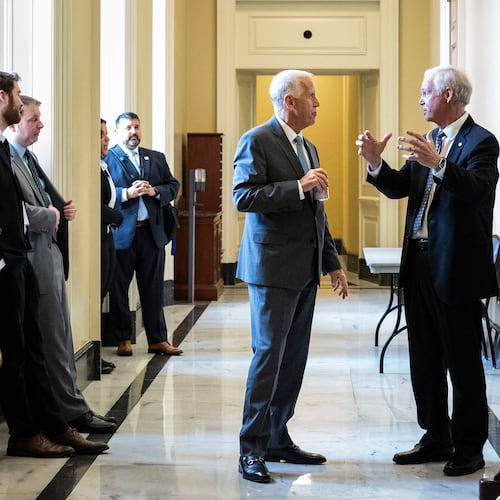Every year, I am privileged to update metro Atlanta’s progress at the Atlanta Regional Commission’s State of the Region breakfast.
Typically, I highlight the latest success stories and explore the challenges our region must address to secure a brighter future. This year, of course, has been anything but typical.
We’re facing a global pandemic that has upended our lives. Our economy has been seriously hampered, particularly for those on the lower end of the wage scale. And people here at home and across the nation are speaking out about racial equity and inclusion.
I am heartened by how people from all walks of life in the Atlanta region found their courage to meet this moment, especially the health care workers and other essential employees who perform critical duties that keep our community going.
Credit: contributed
Credit: contributed
But it’s also clear that today’s health and economic crises have magnified the systemic problems that lower-income families and minorities in our region have long faced.
In our region, a child born in the lowest income tier has a less than 5 percent chance of reaching the top tier in their lifetime, which ties for last in the U.S. among large metro areas.
There are many reasons for the inequality that persists. I’ll focus on two topic areas that stand out, and highlight efforts – I call them bright spots – that aim to make a difference.
The first topic is housing affordability, and its related challenge, housing stability. Housing, of course, is fundamental to our quality of life. But today, our region suffers from a growing lack of quality affordable housing.
Rents are rising much faster than wages. And about one in three residents are now “cost burdened” -- that is, they spend 30 percent or more of their income on housing.
Providing more quality, affordable housing has the potential to transform our region.
Neighborhoods and schools will become more stable, as fewer families will have to move regularly in search of cheaper rent. People will have greater ability to afford vital services, such as healthcare. And increased levels of home ownership will help people build wealth and climb the socioeconomic ladder, reducing the “wealth gap” that exists between owners and renters.
The challenge is being tackled head-on by local governments, private industry, and nonprofit groups.
For example, the Lawrenceville Response Center in Gwinnett County is taking an innovative, holistic approach that helps families with housing, employment, and health and nutrition. It’s a gamechanger for the people it serves.
To deal with the immediate crisis of housing stability and to head off a potential wave of evictions, ARC has teamed with the United Way of Greater Atlanta, the Community Foundation for Greater Atlanta, and the Metro Atlanta Chamber on an initiative called SOARR – Saving Our Atlanta Region’s Residents – to raise funds to help tenants avoid eviction and to keep landlords afloat.
ARC has also been working closely with a wide range of stakeholders over the past two years to develop the Metro Atlanta Housing Strategy. This robust framework, found at MetroATLHousing.org, is designed to help local communities better understand their housing challenges and provide dozens of actionable steps they may consider taking, based on their needs.
A city or county, say, could decide to revise its zoning codes to allow for a greater mix of housing types, such as duplexes, quadplexes, or townhomes, that offer a more diverse array of price points. Or financial incentives may be provided to foster the creation and preservation of affordable housing units.
None of this will be easy. Changing the status quo will require great determination and resolve among our region’s leaders, not to mention a willingness to engage in tough conversations. But I’m confident that we have the tools and the desire needed to move forward.
The second topic area is economic opportunity – or, as I mentioned earlier, the lack thereof for too many local residents.
Between January and May of this year, the employment rate for low-wage workers in metro Atlanta plummeted by nearly half. Indeed, finding a good, stable job -- one with a decent wage, benefits, and the chance to move up – may seem impossible to some.
Fortunately, help is on the way. Equity@Work is a new effort of several regional organizations, the Federal Reserve Bank of Atlanta, and the Blank Foundation, to make the job search a more equitable, accessible arena.
And the Atlanta region’s five WorkSource agencies have created a unified website, ATLWorks.org, that makes it easier for people to find meaningful work.
This can be transformational for people like Perrie Gooden, a single mom who a few years ago found herself stuck in a low-paying career and having a desire to attend nursing school. Perrie connected with WorkSource Atlanta Regional, which provided guidance and funding to support her journey, even helping with the cost of tuition and childcare.
But pursuing education beyond high school can be a daunting challenge for some students. Imagine the hurdles facing someone who is the first in their family to even consider going to college or a trade school.
That’s where OneGoal comes in. This national program helps students navigate the entire process, from 11th grade through their first year in postsecondary education.
OneGoal is now part of a regional education partnership called Learn4Life that began several years ago with a mission to find impactful programs and bring them to even more students in metro Atlanta. Students like Amber Ponder of Atlanta, who before OneGoal figured college wasn’t in her future. But now, she’s thriving as a freshman at Gordon State College, where she’s studying nursing.
For every person like Perrie and Amber who are overcoming challenges, there are too many we’re not reaching. And so, it takes all of us pitching in. Every one of us must help someone find their courage, resources, and guidance, to find an affordable home, stay in their home, step into a new job, or advance their education.
We all want to see the Atlanta region grow and to truly be a “city that is not too busy to care.”
Doug Hooker is executive director, Atlanta Regional Commission.
About the Author
Keep Reading
The Latest
Featured




